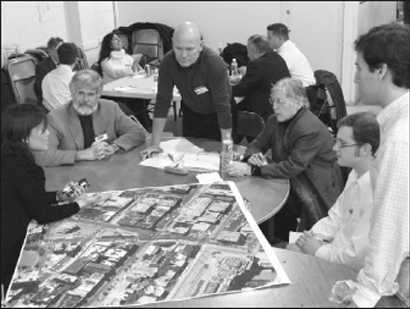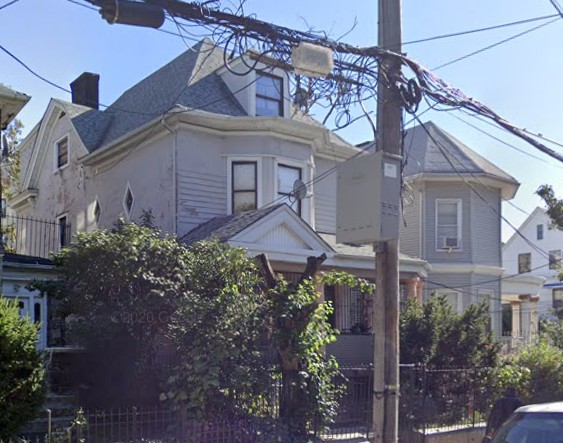By Brooke Edwards
Dan Giove fondly recalls time spent thumbing through the latest and rarest electronica at the East Village’s Dubspot Records while chatting with the store’s owner, Makoto. That was before Dubspot succumbed to the fate of many music stores in the post-MP3, CD-burning era and shut its doors in early 2002.
But now, with Makoto’s blessing, the Dubspot legacy is being reinvented. Only now they don’t sell you the records; they teach you what to do with them.
Dubspot — subtitled DS14 for short — is the name of the “D.J. academy” Giove recently opened at 348 W. 14th St. in the heart of the city’s new club mecca, the Meatpacking District. Offering beginner-to-advanced classes in D.J.’ing, V.J.’ing (video jockeying) and music production, Dubspot plans to fill what Giove saw as a void for those looking to hone their skills in the industry.
“I had done some D.J.’ing myself and was actually looking for somewhere to take classes in music production,” Giove said. “I took a few classes, but didn’t get much out of them.” Giove decided to create his own school where he could be not only the president, but also a student.
“Then came the fun part,” Giove said. “I got to look around at all of these big-name D.J.’s and say, ‘Who do I want to learn from?’”
That’s when Giove hooked up with longtime friend J.P. Solis, resident D.J. at Chelsea super-club Crobar. Aside from his regular nightclub gig, Solis has built quite a résumé for himself, opening with D.J. AM for the Black Eyed Peas and D.J.’ing parties for the likes of MTV, Esquire magazine and President Bill and Senator Hillary Clinton. Solis had been toying with the idea of holding D.J. workshops to pass on his skills. Joining forces with Giove was the perfect solution.
Along with Solis, Giove added to his team house-music D.J. and producer Dustin Cooke; 5th Platoon’s hip-hop D.J.’s and producers Neil Armstrong and D.J. Daddy Dog; and resident Crobar V.J., Chris Biggins.
Then the work began.
“First, we did lots of research and interviews with people who took classes at other schools and weren’t happy with the results,” Giove said. From that research, the group began to develop the Dubspot courses.
“We’ve been meeting once a week for the last five months to build a curriculum,” Giove said.
All of the planning came together as Dubspot recently held its first beginner D.J. class. The class was full, and — surprisingly, for this still male-dominated field — two-thirds of the students were female.
The interior of Dubspot manages to be both intimate and impressive. Giove proudly describes the cobblestone entryway leading to cherry hardwood floors, exposed brick walls and a view of 14th St. as a backdrop, and the fact that Dubspot features some of the latest and most sought-after equipment in the business.
The workstation of each student/aspiring D.J. includes a 17-inch iMac, Serrato Scratch Live software, Technic 1210 turntables, Pioneer CDJ 1000 CD players, a Rane 56 mixer and Sony’s top-of-the-line studio headphones.
Today’s D.J.’s are as slick on the computer mouse as the two turntables. A signature technique of D.J.’ing, “scratching” — which traditionally involves the D.J. manually flipping a record backwards or back and forth while it’s playing on the turntable — can be done without the actual record here, thanks to the special software; as is seen increasingly with working D.J.’s, the music is digital.
Using the software (which retails for $525), the D.J. academy students transfer digital tracks to a special time-coding control record that comes with the program, and can then manipulate the music file via the control record.
For those looking to create their own tracks, Giove designed turntables that slide out to reveal AKAI’s complete music production machine. He included the latest MIDI controller and virtually every big-name software program in the field, including the latest versions of Ableton Live, Reason and Logic Pro.
In the up-and-coming area of V.J.’ing — the art of projecting video images and films in nightclubs — Dubspot features Pioneer DVJ X1s and software such as Arkaos.
Beyond teaching the technical aspects of the industry, Dubspot also plans to show its students how to program, how to read a crowd and how to promote oneself in the field. Intermediate students will leave class with a 20-to-60-minute demo of their own mix, while advanced students who impress Giove and Solis may land an opener spot at Crobar.
Dubspot is the second major D.J. school to recognize the potential New York City holds for catering to aspiring D.J.’s. Scratch DJ Academy — located at 434 Sixth Ave. in the Village — opened in 2002 and has been packing classes ever since.
Giove said Dubspot plans to stand out from its primary competitor by offering experienced teachers — rather than guest spots by big-name D.J.’s — and smaller class sizes. While Giove said Scratch may have 30 to 60 students per class with some students sharing a D.J. rig, Dubspot limits its classes to six students, each with his or her own workstation. Also, Dubspot is the first to offer courses in V.J.’ing.
A spokesperson said Scratch DJ Academy was not aware that a new school had opened in the city and declined to comment.
The opening of Dubspot raises concern for more than just its competition. The idea of attending a D.J. school is also controversial among practicing D.J.’s and promoters.
“For there to be a D.J. school is kind of deflating the practice,” said D.J. Jose NYC. D.J. Jose has played several venues in New York, including the Red Revolution events and a regular stint at the Bruckner Bar in the Bronx.
“They are diluting the art form by killing the undergroundedness that makes it edgy,” he said.
Instead, most D.J.’s pride themselves on being self-taught.
D.J. Jose NYC said, “I learned on my own and by playing with what was even at the time a dated Numark dual CD player, Gemini mixer and EFX.”
D.J. Jose NYC also does not believe that going to school will help a D.J. get ahead in the business.
“Getting a certificate for learning how to ‘scratch’ might give you a boost of morale, but in all reality, it doesn’t make you a pro,” he said.
“I’ve actually never hired a D.J. who attended an academy,” said Justine Delaney, a D.J. and promoter known for pulling off the now-infamous MotherF—ker events and for booking D.J.’s to one of Brooklyn’s biggest clubs, Studio B.
“All D.J.’s I know or worked with have never been to school for D.J.’ing, including myself,” Delaney said.
There is also concern that D.J. schools will add to an already oversaturated market.
“Currently in New York nightlife, everyone claims to be a D.J.,” Delaney said. “It seems to be in vogue, so it’s necessary to weed out the actual D.J.’s with vision from the imposters.”
Dubspot’s Silos said that’s the point.
“Everyone is a D.J.,” he said. “If you have iTunes and you decide what songs to play in what order, then you are a D.J. But that doesn’t mean you know how to mix or how to tell a story with your music. And that’s where we come in.”































